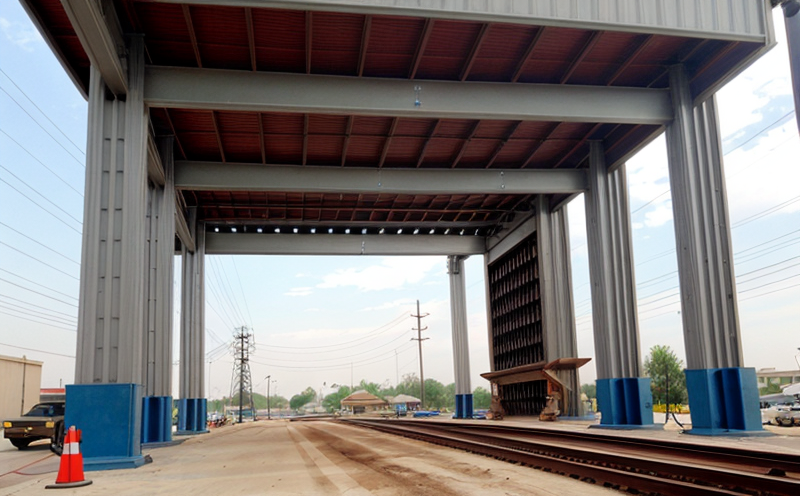NASA-STD-5017 Composite Structural Testing of Space Hardware
The NASA-STD-5017 standard is a critical document that provides guidelines for the mechanical and structural testing of composite materials used in aerospace and aviation applications. This standard ensures that all composite components meet stringent performance requirements necessary for space hardware, which must withstand extreme environments and rigorous operational demands.
Composite materials are widely used in space vehicles due to their high strength-to-weight ratio and corrosion resistance. However, these benefits come with the challenge of ensuring they perform reliably under the most adverse conditions. NASA-STD-5017 addresses this by detailing test methods that simulate real-world stressors such as thermal cycling, vacuum exposure, and mechanical loading.
Under this standard, testing is conducted to evaluate the structural integrity and material properties of composite structures. The primary focus includes tensile, compressive, shear, flexural, and impact tests. Specimens are prepared according to stringent specifications outlined in NASA-STD-5017, ensuring that the test results accurately reflect the performance characteristics of the actual hardware.
The testing process involves precise instrumentation and data collection techniques to ensure accurate measurement of stress-strain behavior, fatigue life, and failure modes. Compliance with these standards is essential for aerospace companies seeking certification from NASA or other regulatory bodies.
One key aspect of this standard is the emphasis on non-destructive evaluation (NDE) methods to assess composite integrity without damaging the specimen. This includes ultrasonic testing, radiography, and magnetic particle inspection, among others. These techniques are crucial for identifying flaws early in the manufacturing process or during service life.
Another important feature of NASA-STD-5017 is its requirement for detailed reporting. Reports must document all test parameters, including environmental conditions, loading protocols, and NDE results. This comprehensive documentation ensures transparency and repeatability, which are vital for quality assurance in aerospace manufacturing.
The standard also covers the qualification of testing facilities and personnel, ensuring that only qualified labs perform these critical tests. This includes training on specific equipment and adherence to strict quality control procedures.
By adhering to NASA-STD-5017, companies can ensure their composite materials meet the highest industry standards for durability and reliability. This not only enhances product performance but also reduces risks associated with potential failures in space vehicles.
| Application Area | Description |
|---|---|
| Aerospace Structures | Incorporation of composite materials in aircraft and spacecraft structures. |
| Thermal Protection Systems | Use of composites for thermal protection against extreme temperatures during re-entry. |
| Fuel Tanks | Application of composite materials to enhance fuel tank durability and reduce weight. |
| Propulsion Systems | Inclusion of composites in engine components for improved efficiency and longevity. |
Why It Matters
The reliability and durability of composite materials are paramount in the aerospace industry, where performance must be flawless under extreme conditions. NASA-STD-5017 ensures that every component undergoes rigorous testing to meet these demanding requirements.
These tests help identify potential weaknesses or failures before they occur during operational use. By catching issues early, manufacturers can address them proactively, reducing the risk of catastrophic failure in space vehicles. This proactive approach is particularly important given the high costs and critical nature of aerospace projects.
The standard also promotes best practices for testing facilities and personnel, ensuring that only qualified experts perform these tests. This consistency in methodology enhances reliability across different manufacturers and test labs.
Compliance with NASA-STD-5017 is not just about meeting regulatory requirements; it’s about building trust with customers and stakeholders. Meeting this standard demonstrates a commitment to excellence, which can be a significant competitive advantage in the aerospace industry.
Industry Applications
| Application Area | Description |
|---|---|
| Aerospace Structures | Incorporation of composite materials in aircraft and spacecraft structures. |
| Thermal Protection Systems | Use of composites for thermal protection against extreme temperatures during re-entry. |
| Fuel Tanks | Application of composite materials to enhance fuel tank durability and reduce weight. |
| Propulsion Systems | Inclusion of composites in engine components for improved efficiency and longevity. |
Why Choose This Test
The NASA-STD-5017 Composite Structural Testing is a crucial service for aerospace companies committed to producing reliable, high-performance components. Here are several reasons why choosing this test can be beneficial:
Regulatory Compliance: Meeting these standards ensures compliance with NASA requirements and other relevant regulations. This can facilitate easier certification processes and reduce the risk of non-compliance penalties.
Enhanced Product Reliability: Rigorous testing helps identify potential weaknesses in composite materials early, allowing manufacturers to address issues before they become critical problems.
Customer Trust: Companies that adhere to these standards build trust with their customers and stakeholders. This can translate into increased market share and better reputation.
Competitive Edge: Meeting high standards like NASA-STD-5017 can set a company apart from competitors, demonstrating a commitment to excellence in product quality.
Cost Savings: Early identification of flaws through comprehensive testing can save significant costs by preventing costly failures during operational use.





